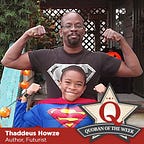Killmonger’s Lament
Why Killmonger (and Black Panther) resonates with the African Diaspora
8 min readMar 22, 2018
There are lots of posts talking about the fight scene in the movie phenomenon that is Black Panther between Erik Killmonger and T’challa for the leadership of the kingdom of Wakanda.
Most of the discussions talk about the ethics of the Wakandan people in remaining isolationists during…
